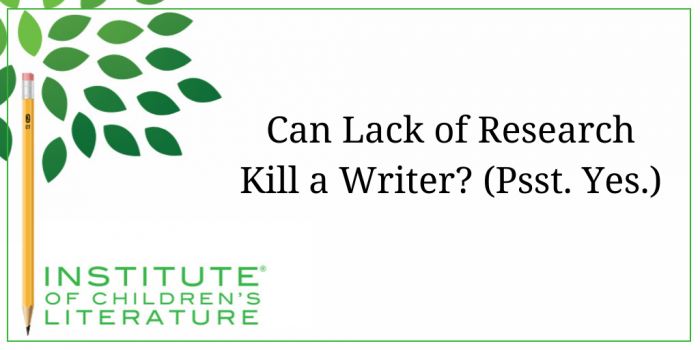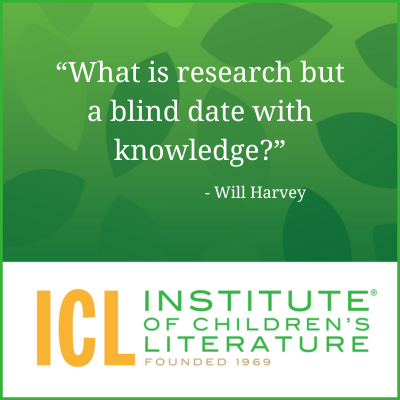1000 N. West Street #1200, Wilmington, DE 19801
© 2024 Direct Learning Systems, Inc. All rights reserved.
Beginning Tuesday, July 22, 2025 at 10 PM CT through Wednesday, July 23, 2025 at 4 AM CT, we will be performing scheduled maintenance to update our website.

One of the most valuable things writers can do in our society is tell the truth. But the truth requires facts and facts require research. We have all kinds of valuable research options both online and in the “real” world. We can talk to people, visit places, read original documents, and examine the research of others. But the vast wealth of information available these days can make it hard to sort out what is true and honest, and what has been tainted in one way or another. That’s why a savvy writer is a bit of a hard-boiled detective. We don’t take anything at face value. We dig. We examine. We ask questions. And only when we’re sure, we pass along a “fact.”

Let’s take something we mostly all grew up with: if you’ve got a werewolf, you should find some wolfsbane. I recently saw a television program (fiction, of course) where a character had been bitten by a werewolf, so they treated the bitten man with wolfsbane tea to keep him from turning into a wolf. That certainly seems a fun twist on the legend, right?
Unfortunately the program in question is clearly aimed at families and wolfsbane is incredibly poisonous. Thankfully, the growth conditions needed for wolfsbane (or aconite) are fairly strict so most kids won’t come across the plant. But imagine one does. Wolfsbane is so poisonous that just picking a big bunch and carrying it around can kill you. I could certainly imagine a child doing that when playing “werewolf,” couldn’t you? Now, the writer who gave the television character wolfsbane tea didn’t mean any harm. I’m sure he (or she) didn’t know that wolfsbane is so poisonous. But our responsibility as writers is to learn, to know, and to make our decisions based on knowledge of what’s true and factual.
So, as you uncover each research source, you play like a hard-boiled detective, hammering at it repeatedly to get at the truth. One way to do this is to look for possible bias. For instance, a website for a company that sells cosmetics which have been tested on animals might decide to put up a “report” on the gentle ways they test their products. They might include photos of scrupulously clean cages and researchers cuddling bunnies. They might show a happy bunny with a tiny dollup of makeup on the skin of his rear and a caption saying the worst that happens is a mild rash, which is quickly treated so the bunnies can go back to being healthy and happy.

Again, the hard-boiled detective in you should spot a bias. The second group, like the first, has good reason to want the public to see things in a very specific way. As a result, they’re naturally going to skew their site to present a specific story. You see both the cosmetic company and the animal-rights group are storytelling. They have chosen their “facts” to tell their story in a specific way. The un-stories facts probably lie somewhere between the sunny bunny story and the evil bunny torture story. As a writer, it’s that reality that we’re looking for and we’ll only find it if we question and consider and dig to find what is real and what is skewed into a very specific story.
We all know that the best source is a primary source. A primary source is one that has direct contact with the facts of the subject. But even a primary source must be poked by the careful researcher before simply accepting what you read. You always want to ask, “Who wrote this piece I’m reading for research and did this person carry in any biases?”

There is another reason to know who the actual writer of a source is. Sometimes when we judge by the sponsor of the source without paying attention to the actual writer, we can make big mistakes. Take The New York Times. Now the NYT can have their own story to tell, but they do pride themselves on the accuracy of their facts. So you might look askance at the story they’re trying to tell, but you can usually trust the facts that the story rests on. The NYT doesn’t simply make things up. So if you read it in the Times, it’s solid. Well, except when it isn’t. Andy Borowitz is a satirical writer for the NYT. As with most satirical writers, Borowitz is totally concerned with the story he is telling. And since he is a well-known satirical writer, he is comfortable with simply making stuff up, because he knows people will know what he writes is just satire to present his point of view. And this is true. Except when it isn’t. A researcher who is unfamiliar with Borowitz but knows the NYT is careful with facts might pick up a “fact” from a Borowitz piece and end up spreading made up “facts.”
A hard-boiled detective is uncomfortable with anonymous sources. You can’t know their bias. You can’t know what story they’re trying to tell. You can’t know what style they normally use in their storytelling. Something with no name behind it might be interesting to help you see the bigger picture of your research, but for the sake of accuracy, keep digging until you can hang your facts on a source you can trust.
Any hard-boiled detective worth his grubby trench coat knows you don’t just take the word of the first person you run across. As a writer, we never build a piece on just one source. There are reasons for this that involve accuracy and reasons that involve ethics. We don’t want to be paid for just milking someone else’s work, and building an entire piece on one source is basically just rehashing someone else’s work and then presenting it as ours. We need to do what any good detective (or journalist) does, we need to look for as many sources as possible so we have a clear picture and an accurate one. And so that we can create a final piece that is truly ours and built on our work.

For instance, suppose you’re writing a biography. You’ve cast the net wide and you discover three different towns all reported as the birthplace of your subject, along with five different years of his birth. What do you do if you cannot discover which one is right? Sometimes (if the mood of your piece is right and you have enough word count available) you can have some fun with this surprising discovery. You might say that researchers differ on where the person was born and when, but we know he was born … and then you give the information you do know. You may choose to give all the different possible birthplaces and dates and let the reader pick for himself. You might expand the specifics to what you can be certain of. For instance if all the possible birthplaces are in the Midwest, you can say the source was born in the Midwest. The one thing you do not want to do is simply pick one of the disputed facts randomly and run with it, figuring that at least you weren’t the first person to do it.
As writers, we owe young readers accurate facts because these are the truths upon which they will build their understanding of the world. So our research is part of our obligation to our reader. And it’s part of our obligation to our publisher as well. Many publishers will want to see bibliographies that reflect careful research that is both deep and wide. So as we search for the best, more accurate facts, it pays to be a little suspicious, and more than a little smart. Good luck with it––and here’s looking at you.
With over 100 books in publication, Jan Fields writes both chapter books for children and mystery novels for adults. She’s also known for a variety of experiences teaching writing, from one session SCBWI events to lengthier Highlights Foundation workshops to these blog posts for the Institute of Children’s Literature. As a former ICL instructor, Jan enjoys equipping writers for success in whatever way she can.
1000 N. West Street #1200, Wilmington, DE 19801
© 2024 Direct Learning Systems, Inc. All rights reserved.
1000 N. West Street #1200, Wilmington, DE 19801
© 2024 Direct Learning Systems, Inc. All rights reserved.
1000 N. West Street #1200, Wilmington, DE 19801
© 2024 Direct Learning Systems, Inc. All rights reserved.
1000 N. West Street #1200, Wilmington, DE 19801
© 2025 Direct Learning Systems, Inc. All rights reserved.
1000 N. West Street #1200, Wilmington, DE 19801
©2025 Direct Learning Systems, Inc. All rights reserved. Privacy Policy.
2 Comments